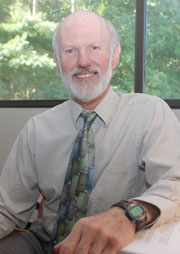  |
| HOME | THIS ISSUE | CALENDAR | GRANTS | BACK ISSUES | < BACK | NEXT > |
Psychologist offers program to help people deal with stressby Maureen McGuire- September 24, 2007 | ||||
| A popular group therapy course at the Health Center mixes elements of Eastern and Western medicine to help people recognize and manage life’s many challenges – from day-to-day stressors like traffic jams and bad cell phone service to serious issues such as living with a chronic illness. “What people gain through this class is the ability to become aware of their self-defeating habits, such as negative ways of reacting to stress, and the ability to deal with those issues with new skills,” says Norman Andrekus, a Health Center psychologist who teaches the Personal Health Improvement course several times a year. The course is open to men and women, and is covered by most insurance plans. In the nearly 10 years since the program was launched, participants have included many types of people, from corporate executives to students, all looking for ways to reduce stress and overcome personal obstacles. “We integrate meditation, Buddhist principles, and cognitive behavioral principles,” Andrekus says. “Because we are in a group setting, participants benefit from the support of others, as well as from a teacher who believes in what they are doing.” He says he loves teaching the class: “I get to introduce participants to great thinkers, from the Buddha to Robert Frost, and give people tools to live more wholesome, less stressful lives.” The course lasts for six weeks, with two-hour meetings once a week. It is taught to groups of between six and 12 people. Andrekus meets with each participant individually before the course begins, and after it ends. For the course, participants receive a workbook detailing the specific themes for each of the six classes, as well as journal pages and a reading list. Participants are asked to write specific “learning goals” that focus on areas of their lives that need attention and improvement. Class themes include observing how you react to stressful situations; improving communication by making clear and specific requests; and overcoming suffering and negative moods. Andrekus draws heavily on the Buddhist principles of “mindful” awareness – being aware of your thoughts and actions – and observing how you react to certain triggers and situations. “The goal is to help people reduce their stress by changing the way they respond to certain situations,” he says.
Each class starts with a 15-minute guided meditation, and Andrekus encourages participants to meditate on their own every day. “The practice of daily meditation leads to calming, soothing behaviors,” he says. He notes that recent studies from the University of Wisconsin, Massachusetts General Hospital and elsewhere have looked at the positive effects of meditation on overall health. Because chronic medical conditions are often stressful, Andrekus says, the course appeals to people coping with illness. “For all participants, the focus on meditation is to help people take a ‘mini-vacation’ from their pain, regardless of the source of that pain,” he says. Dr. Jayesh Kamath, who sees patients in the Health Center’s psychiatry department and runs a clinic in the Neag Comprehensive Cancer Center to help patients cope with fatigue and depression, participated in the course recently and has referred patients to the program. He says the course is “a wonderful combination of the core beliefs of eastern and western medicine.” “It helped me to see physical symptoms in the context of emotional symptoms,” Kamath says. “Physical symptoms can be a response to stress. The course helps participants better understand why certain symptoms occur and how they can manage the triggers that lead to those symptoms.” In meetings with participants at the end of the course, Andrekus often hears that they feel more empowered in their lives. “People tell me they’ve learned how to manage their pain, and are experiencing less anxiety,” he says. “Although the program meets for only six weeks, my goal is to give participants tools and resources they can draw upon throughout their lives.” To learn when the next course will begin, call 860-679-6700, option 3, and ask for Virginia. |
| ADVANCE HOME UCONN HOME |

